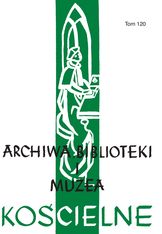PSYCHES IATREION, CZYLI CIESZYŃSKA BIBLIOTEKA KS. LEOPOLDA JANA SZERSZNIKA
PSYCHES IATREION, OR THE CIESZYN LIBRARY OF REV. LEOPOLD JAN SZERSZNIK
Author(s): Marzena Bogus-SpyraSubject(s): Cultural history, Library and Information Science, Archiving, 18th Century, 19th Century
Published by: Katolicki Uniwersytet Lubelski Jana Pawła II - Wydział Teologii
Keywords: library; Cieszyn; Jesuits; Rev. Leopold Jan Szersznik; Cieszyn Silesia;
Summary/Abstract: The life attitude and scholarly interests of Leopold Jan Szersznik (1747–1814) were influenced both by factors related to his home upbringing and his institutional education, which consisted of philosophical studies at the Jesuit academy in Olomouc, novitiate at the Jesuit convent in Brno, studies in Březnica, study at the academic college of St Clement in Prague, then at the college in Cheb and theological studies in Prague. In November 1775, L.J. Szersznik decided to return to Cieszyn. From Bohemia he brought back a number of books that were the basis for later collections. The basis of his early collection were works on Slavic history, the history of the Society of Jesus and the life of Bohuslav Balbín. Szersznik, who took a position as a professor at a grammar school in Cieszyn, set himself the goal of establishing a library at the school worthy of the new era. When efforts to acquire suitable volumes proved unsuccessful, he decided to put his own collection into the public domain. Permission to set up a library came in 1801, and the ex-Jesuit considered this date the beginning of his foundation library, which opened in 1802 and became the first public institution of its kind in what was then Austrian Silesia, as well as one of the first in what is now Poland. To this day, it ranks among the most valuable Silesian historical collections. Thanks to Szersznik’s efforts and financial support, the collection of several thousand volumes, including manuscripts, was properly secured and organized according to the old section-based scheme that facilitates orientation in the book collection, which was eventually divided into 27 thematic and formal groups. The most extensive section was devoted to the works of lay historians. The second largest section is the collection of works by poets, followed by mathematicians and theologians, philosophers, lawyers, economists, naturalists, grammarians, geographers. Szersznik made sure that the collected volumes would serve not only his students, but also future generations, and that future residents of Cieszyn and visitors who wish to visit the place would also benefit from them. Thanks to the established foundation, the ex-Jesuit’s collection remains the pride of the town to this day. The works collected by Szersznik are often rarities, which cannot be found in other institutions. The collection is an example of a Baroque-Enlightenment library with original interior design, and can still be revered at the Cieszyn library. According to the founder’s will, it can serve not only for the development of science, but also for the healing of the soul.
Journal: Archiwa, Biblioteki i Muzea Kościelne
- Issue Year: 2023
- Issue No: 120
- Page Range: 63-88
- Page Count: 26
- Language: Polish

